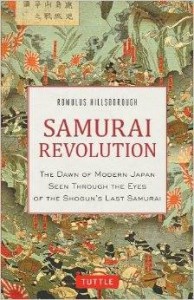Katsu Kaishu gave an interview to the Kokumin Shinbun which appeared in that newspaper’s September 21, 1898 issue, just months before his death in the following January. In the interview Kaishu imparted a moral lesson he had learned from “a holy man,” who had lived “long ago.” Since I didn’t include Kaishu’s moral lesson in Samurai Revolution, I present it here:
The holy man’s “prayers worked well in the lottery, which was popular back then—and for that reason he had a very good reputation,” Kaishu said. “Since my father was friendly with him, I visited him sometimes.” But eventually strict government controls were placed on the lottery and the holy man “was reduced to poverty. . . . But that holy man was quite a fellow. Not only did he eat meat and have a wife of his own, but he had no qualms about being with someone else’s wife. . . . Having wound up in such reduced circumstances, however, he grew weak in body and spirit. One day when I visited him, I brought a little something with me. He looked at me and said, ‘You’re still young, but perseverant and reliable. So I’m going to tell you a little story.’”
According to the holy man’s story, there were two other reasons that his prayers for the lottery stopped working. One had to do with a beautiful young woman who “came to ask for my prayers in the lottery. But since she was so beautiful I couldn’t help but desire her. I seduced her then gave her my prayers.” The prayers worked; the woman won the lottery. A few days later she returned to the holy man’s home to thank him. “I tried to seduce her again. But she only stared at me with frightening eyes,” saying that the only reason she had been unfaithful to her husband was so that he would get the lottery money. “Her eyes and the hissing in her voice pierced me to the quick.”
The other reason that the man’s prayers no longer worked had to do with a large snapping turtle he had bought because “I needed something nutritious to eat.’” But “’when I went to cook it, the damn turtle lifted up its head and stared right at me with its big eyeballs. I said, ‘What’s this?’ Then I cut off its head, cooked it, and ate it. But somehow I was bothered.” And because he felt guilty about those two incidents, his “prayers gradually stopped working.”
Katsube Mitake, in his biography of Katsu Kaishu, attaches a Buddhistic moral to the story: Never do evil. Always do good. When Kaishu “heard this story, its truth burst upon me like a sudden flash. And to this day I have not forgotten it. The reason that even at my present age [seventy-five] I am still mentally and physically sound is because its power remains with me at all times—and looking back upon my own personal experiences I don’t remember ever having mistaken the way that a human being should live.”
(The photo is of Katsu Kaishu in his old age.)
Sources
Hikawa Seiwa (Katsu Kaishu Zenshu 21) Tōkyō: Kodansha, 1973 (pp. 296-97)
Katsube Mitake. Katsu Kaishu. vol. 1. Tokyo: PHP, 1992 (p. 348)
For updates about new content, connect with me on Facebook.
Samurai Revolution is the only biography of Katsu Kaishu in English.

